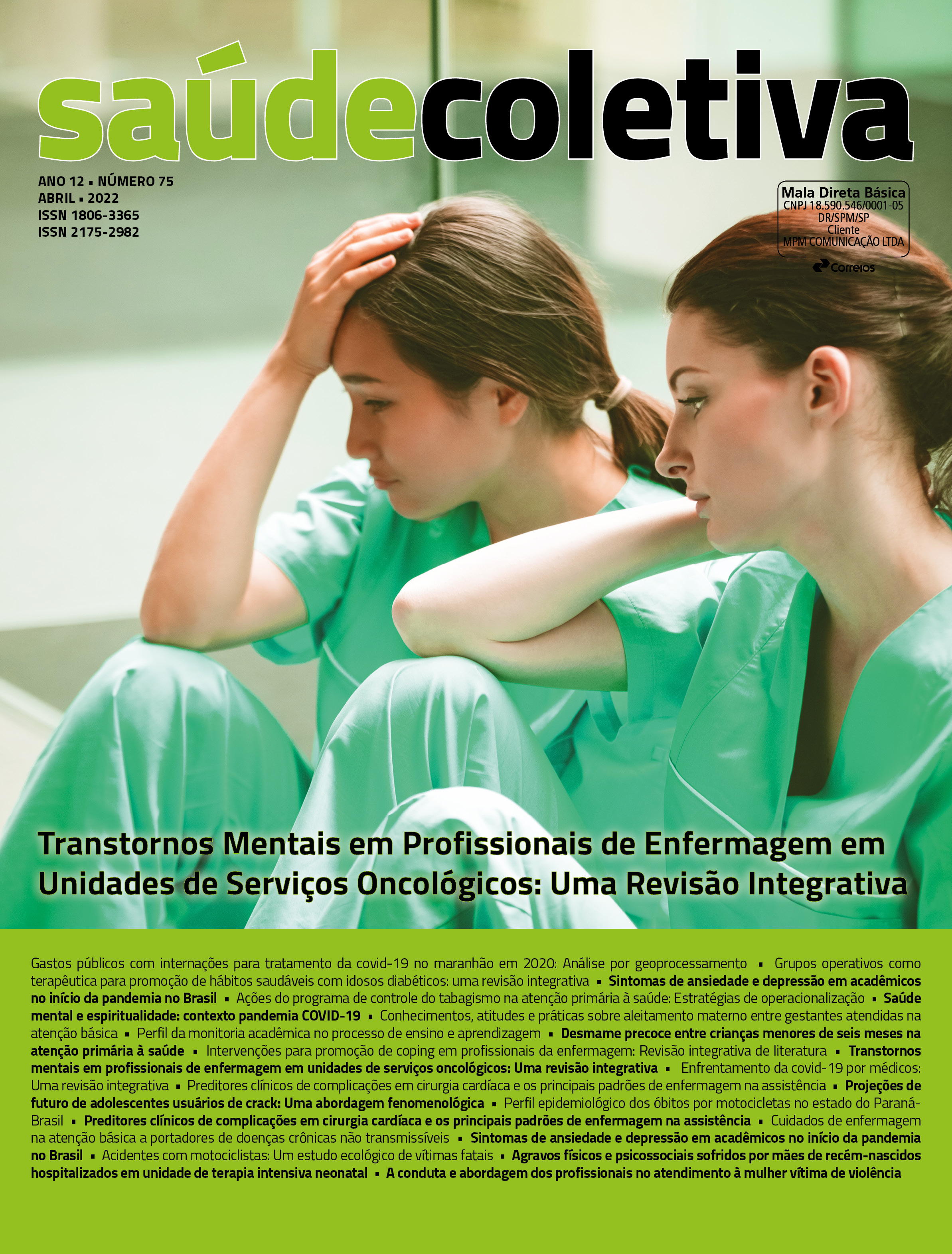Conhecimentos, atitudes e práticas sobre aleitamento materno entre gestantes atendidas na atenção básica
DOI:
https://doi.org/10.36489/saudecoletiva.2022v12i75p10119-10142Palabras clave:
Conhecimentos, Atitudes e Prática em Saúde, Gestantes, Aleitamento Materno, Fatores de Proteção, Cuidado Pré-Natal, DesmameResumen
Objetivos: avaliar os conhecimentos, atitudes e práticas sobre o aleitamento materno entre gestantes atendidas durante o pré-natal e indicar os motivos do desmame precoce. Método: estudo transversal quantitativo do tipo Conhecimentos, Atitudes e Prática, com 110 gestantes atendidas durante o pré-natal em município brasileiro em 2019, através de formulário analisado por meio de estatística descritiva e inferencial, através de frequências e testes Quiquadrado e Exato de Fisher, com significância ≤0,05. Resultados: Houve associação entre faixa etária com conhecimento(p=0,003), atitude(p<0,0001) e prática(p=0,015). Mulheres acima de 26 anos têm 11%(OR=0,119[0,025-0,561]) mais chance de possuir saberes adequados e mulheres não brancas possuem 90%(OR=0,905[0,848-0,966]) de chance para o mesmo desfecho. A idade despontou como fator de proteção em 18%(OR=0,187[0,071-0,490]) para a atitude e 29%(OR=0,291[0,105-0,806]) para a prática. Paridade associou-se à prática(p=0,040). Conclusão: mulheres mais maduras possuem conhecimento, atitude e prática satisfatórios. Traumas mamilares, ausência de rede de apoio, abandono sem motivo definido e dor são os principais motivos para desmame precoce.
Citas
Gupta PM, Perrine CG, Chen J, Elam-Evans LD, Flores-Ayala R. Monitoring the World Health Organization global target 2025 for exclusive breastfeeding: Experience from the United States. J Hum Lact. 2017; 33(3):578-81. doi: https://doi.org/10.1177/0890334417 693210
Boccolini CS, Boccolini PDMM, Monteiro FR, Venâncio SI, Giugliani ERJ. Breastfeeding indicators trends in Brazil for three decades. Rev Saude Publ. 2017; 51:108. doi: https://doi.org/10.11606/S1518-8787.2017051000029
Baldissera R, Issler RMS, Giugliani ERJ. Effectiveness of the National Strategy for Healthy Complementary Feeding to improve complemantary feeding of infants in a municipality in Southern Brazil. Cad Saude Publ. 2016; 32(9):e00101315. doi: https://doi.org/10.1590/0102-311X00101315
Ramos AE, Ramos CV, Santos MM, Almeida CAPL, Martins MCC. Knowledge of healthcare professionals about breastfeeding and supplementary feeding. Rev Bras Enferm. 2018; 71(6):2953-60. doi: http://dx.doi.org/10.1590/0034-7167-2017-0494
Al Ketbi, M. I., Al Noman, S., Al Ali, A., Darwish, E., Al Fahim, M., & Rajah, J. Knowledge, attitudes, and practices of breastfeeding among women visiting primary healthcare clinics on the island of Abu Dhabi, United Arab Emirates. International breastfeeding journal, 2018; 13(1), 1-14
Radwan H. Patterns and determinants of breastfeeding and complementary feeding practices of Emirati mothers in the United Arab Emirates. BMC Public Health. 2017;13:171
Al Tajir GK, Sulieman HS, Badrinath P. Intragroup differences in risk factors for breastfeeding outcome in a multicultural community. J Hum Lact. 2016;22(1):39–47
Al-Binali AM. Breastfeeding knowledge, attitude and practice among school teachers in Abha female educational district, southwestern Saudi Arabia. Int Breastfeed J. 2017;7:10
Andrade SSDC, Zaccara AAL, Leite KNS, Brito KKGD, Soares MJGO, Costa MML, et al. Knowledge, attitude and practice of condom use by women of an impoverished urban area. Rev Esc Enferm USP. 2015; 49(3):364-71. doi: https://doi.org/10.1590/S0080-623420150000300002
Ghisi GLM, Durieux A, Manfroi WC, Herdy AH, Carvalho T, Andrade A, et al. Construction and Validation of the CADE-Q for Patient Education in Cardiac Rehabilitation Programs. Arq Bras Cardiol. 2010; 94(6):763-71. doi: https://doi.org/10.1590/s0066-782x201 0005000045
Junior MP, dos Santos RZ, Ramos AP, Andrade A, dos Santos LRM, Benetti M. Development and Psycometric Validation of Cancer-Q: Questionnaire about Cancer Patient’s Knowledge of their Disease. Rev Bras Cancerol. 2018; 64(2):173-84. doi: https://doi.org/10.32635/2176-9745.RBC.2018 v64n2.76
Muñoz-Sánchez AI, Rubiano-Mesa YL, Saavedra-Cantor CJ. Measuring instrument: knowledge, attitudes and practices of people with pulmonary tuberculosis. Rev. Latino-Am. Enfermagem. 2019; 27:e3086. doi: https://doi.org/10.1590/1518-8345.2608.3086
Rodrigues AP, Padoin SMM, Aldrighi JD, Paula CC, Ximenes LB. Sociodemographic and obstetric characteristics of post-partum women admitted to rooming-in care in brazil. Ciencia y Enfermería. 2016; 22(1):113-23. doi: http://dx.doi.org/10.4067/S0717-95532016 000100010
Campos AMDS, Chaoul CDO, Carmona EV, Higa R, Vale IND. Exclusive breastfeeding practices reported by mothers and the introduction of additional liquids Rev. Latino-Am. Enfermagem. 2015; 23(2):283-90. doi: https://doi.org/10.1590/0104-1169.0141.2553
Aiga H, Nguyen VD, Nguyen CD, Nguyen TTT, Nguyen LTP. Knowledge, attitude and practices: assessing maternal and child health care handbook intervention in Vietnam. BMC Public Health. 2015; 16(1):129. doi: https://doi.org/10.1186/s12889-016-2788-4
Naseem A, Mazher N. A study to evaluate the knowledge, attitude and practices of exclusive breast feeding among primi mothers of healthy term neonates in a tertiary care hospital and predictors of failure of establishment of exclusive breast feeding in first six months. Int J Contemp Pediatr. 2016; 3(3):810-4. doi: https://doi.org/10.18203/2349-3291.ijcp20161589
Domingues RMSM, Viellas EF, Dias MAB, Torres JÁ, Theme-Filha MM, Gama SGND, et al. Adequação da assistência pré-natal segundo as características maternas no Brasil. Rev Panam Salud Publica [Internet]. 2015 [Cited Jan 15, 2020]; 37:140-7. Available from: http:// portaldeboaspraticas.iff.fiocruz.br/wp-content/uploads/2018/07/v37n3a03.pdf
Cardoso AMR, Marín HF. Gaps in the knowledge and skills of Portuguese mothers associated with newborn health care. Rev. Latino-Am. Enfermagem. 2018; 26:e2997. doi: https://doi.org/10.1590/1518-8345.1859.2997
Oliveira, L. F. Conhecimento das puérperas sobre os benefícios da amamentação em ambiente hospitalar. Cad Esc Saude [Internet]. 2018 [Cited Jan 15, 2020]; 18(1):1-22. Available from: https://portaldeperiodicos.unibrasil.com.br/index.php/cadernossaude/article /view/3784
Gueye M, Mbaye M, Diallo M. Knowledge, attitudes and practices of mothers on breastfeeding in urban environment in dakar. MOJ Womens Health. 2018; 7(3):83-7. doi: https://doi.org/10.15406/mojwh.2018.07.00175
Al Ketbi MI, Al Noman S, Al Ali A, Darwish E, Al Fahim M, Rajah J. Knowledge, attitudes, and practices of breastfeeding among women visiting primary healthcare clinics on the island of Abu Dhabi, United Arab Emirates. Int breastfeed J. 2018; 13(1):26. doi: https://doi.org/10.1186/s13006-018-0165-x
Martins FDP, Leal LP, Linhares FMP, Santos AHDS, Leite GDO, Pontes CM. Effect of the board game as educational technology on schoolchildren’s knowledge on breastfeeding. Rev. Latino-Am. Enfermagem. 2018; 26:e3049. doi: https://doi.org/10.1590/ 1518-8345.2316.3049
Jesus PCD, Oliveira MICD, Moraes JRD. Training of health professionals in breastfeeding and its association with knowledge, skills and practices. Cien Saude Colet. 2017; 22(1):311-20. doi:https://doi.org/10.1590/1413-81232017221.17292015
Gewa CA, Chepkemboi J. Maternal knowledge, outcome expectancies and normative beliefs as determinants of cessation of exclusive breastfeeding: a cross-sectional study in rural Kenya. BMC Public Health. 2016; 16(1):243. doi: https://doi.org/10.1186/s12889-016-2907-2
Deshmukh V, Rasool U, Kalyankar B, Gaikwad R, Yelikar K. Knowledge, attitude and practice of breast feeding at a tertiary care centre in the government medical college and hospital, Aurangabad, India. Int J Reprod Contracept Obstet Gynecol. 2017; 5(6):1913-15. doi: https://doi.org/10.18203/2320-1770.ijrcog 20161689
Victora CG, Bahl R, Barros AJ, França GV, Horton S, Krasevec J, et al. Breastfeeding in the 21st century: epidemiology, mechanisms, and lifelong effect. Lancet. 2016; 387(10017):475-90. doi: https://doi.org/10.1016/S0140-6736(15)01024-7
Horta BL, Mola CL, Victora CGL. Long-term consequences of breastfeeding on cholesterol, obesity, systolic blood pressure and type 2 diabetes: a systematic review and meta-analysis. Acta Paediatr. 2015; 104:30-7. doi: https://doi.org/10.1111/apa.13133
Shub A, Miranda M, Georgiou HM, McCarthy EA, Lappas M. The effect of breastfeeding on postpartum glucose tolerance and lipid profiles in women with gestational diabetes mellitus. Int Breastfeed J. 2019; 14(1):46. doi: https://doi.org/10.1186/s13006-019-0238-5
Dias JS, Vieira TDO, Vieira GO. Fatores associados ao trauma mamilar no período lactacional: uma revisão sistemática. Rev Bras Saude Mater Infant. 2017; 17(1):43-58. doi: https://doi.org/10.1590/1806-93042017000100003
Emidio SCD, Dias FDSB, Moorhead S, Deberg J, Oliveira-Kumakura ARDS, Carmona EV. Conceptual and operational definition of nursing outcomes regarding the breastfeeding establishment. Rev. Latino-Am. Enfermagem. 2020; 28:e3259. doi: https://doi.org/10.1590/ 1518-8345.3007.3259
Vieira EDS, Caldeira NT, Eugênio DS, Lucca MMD, Silva IA. Breastfeeding self-efficacy and postpartum depression: a cohort study. Rev. Latino-Am. Enfermagem. 2018; 26: e3035. doi: https://doi.org/10.1590/1518-8345.2110.3035
Passanha A, Benício MHDA, Venâncio SI, Reis MCGD. Influence of the support offered to breastfeeding by maternity hospitals. Rev Saude Publ. 2015; 49:85. doi: https://doi.org/ 10.1590/S0034-8910.2015049005354
Ferreira HLOC, Oliveira MFD, Bernardo EBR, Almeida PCD, Aquino PDS, Pinheiro AKB. Factors Associated with Adherence to the Exclusive Breastfeeding. Cienc Saude Colet. 2018; 23(3):683-90. doi: https://doi.org/10.1590/1413-81232018233.06262016
Peixoto Dantas, B.., Rodrigues Tassara, K.., Ataides de Moraes, P. H. Ansaloni de Oliveira, R., & Vieira Simões Ansaloni, L. A colaboração do enfermeiro no processo de amamentação por primíparas: superando barreiras e dificuldades. Saúde Coletiva (Barueri). 2020;10(56), 3226–3237. https://doi.org/10.36489/saudecoletiva.2020v10i56p3226-3237
Chaves AFL, Ximenes LB, Rodrigues DP, Vasconcelos CTM, Monteiro JCDS, Oriá MOB. Telephone intervention in the promotion of self-efficacy, duration and exclusivity of breastfeeding: randomized controlled trial. Rev. Latino-Am. Enfermagem. 2019; 27(3). doi: https://doi.org/10.1590/1518-8345.2777-3140







